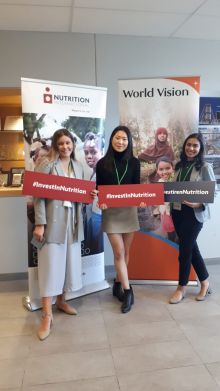
As part of the University of Ottawa’s International Development and Globalization Student Association’s International Development Week conference, Nutrition International and World Vision Canada held the ‘Climate Change & Nutrition: Food for Thought”, a panel discussion and workshop exploring the connection between climate change and nutrition.
During the panel discussion, students heard from a variety of experts in different aspects of climate change and nutrition. Bruce Currie-Alder, Program Leader, Climate Change for Canada’s International Development Research Centre, moderated the panel and spoke about the important work IDRC is leading to understand the impacts of climate change, and its relevance to nutrition and agriculture. Lara Steinhouse, a Nutrition Specialist for Global Affairs Canada, spoke about the impacts on Canada’s own populations, and highlighted the inequal burdens that women and girls face globally as a result of climate change and malnutrition. Laura Snyder, Program Manager for World Vision Canada, spoke about the work that World Vision Canada and Nutrition International are undertaking that is trying to mitigate the negative effects of climate change and their impacts on nutrition in Senegal through the Project intégré de nutrition dans les regions de Kolda et de Kédougou (PINKK). For instance, the project contributes to crop and income diversity to smooth out seasonality, which makes “hunger periods” grow in scale and scope. Ann Witteveen, Senior Director of Global Operations, Nutrition International, reflected on how the PINKK project has specifically been working to improve conditions for women and girls, and the importance of understanding the gendered dynamics of climate change. Women are often responsible for gathering and producing food, collecting water and sourcing fuel for heating and cooking. With climate change, these tasks can take longer and be more difficult. Gender inequality can also dramatically limit the resilience and adaptive capacity of women and restrict options for climate mitigation. Ann stressed the importance of ensuring equal space and resources for women and men to participate in climate change and malnutrition decision making and action at all levels.
Finally, Christopher Huggins, Assistant Professor at the University of Ottawa, spoke about the importance of individual action and our responsibilities as consumers to ensure that we minimize our contributions to climate change.
Following the panel discussion, students worked in small groups to develop their own campaign pitches for increasing government investments in mitigating climate change and improving global nutrition. Their pitches varied from highlighting the burden on women and girls, connecting to Canada’s Feminist International Assistance Policy, and reflecting on Canada’s own contributions to global nutrition and climate change, and our moral imperative to put that right.
2020 is a big year for nutrition. The five-year countdown to the World Health Assembly (WHA) Global Nutrition Targets 2025 will begin, we will be halfway through the United Nations (UN) Decade of Action on Nutrition, and Japan will host the Global Nutrition Summit. While significant progress has been made, there is an urgent need to accelerate action. Nutrition fuels the Sustainable Development Goals (SDGs) – averting malnutrition will help achieve at least 12 of the 17 SDGs and help create a healthy, prosperous, and stable world in which no one is left behind. Students added their voices to a call for continued Canadian leadership and a firm commitment to nutrition at the Global Nutrition Summit.
Nutrition International and World Vision Canada are grateful for the support of all participating organizations and attendees and are excited to see what the future holds for youth advocacy!
Publié:
février 21, 2020
Auteur:
Nutrition International and World Vision Canada
Catégories:
Partager cette publication: